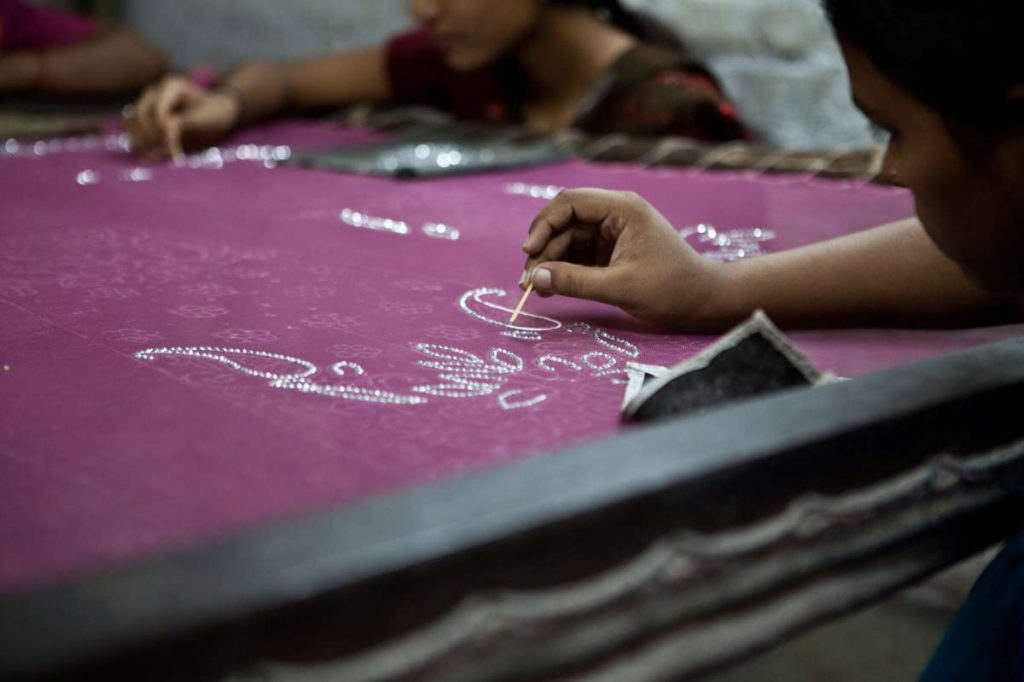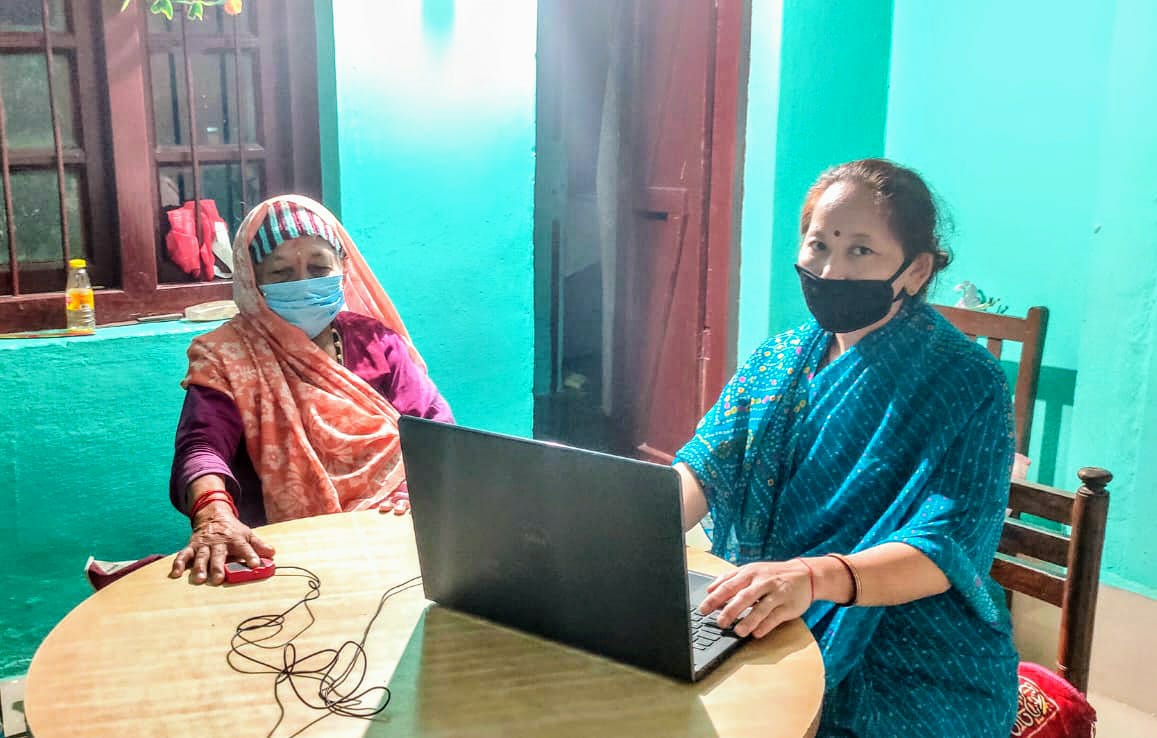Two years ago, Aarti started a small business selling traditional handicrafts online, supporting artisans based in rural Karnataka. After an initial phase of struggle, she had a steady stream of orders and was looking to procure manufacturing equipment and scale the impact of her business by supporting more local talent.
All this came to a grinding halt in March 2020. The pandemic, and subsequent lockdown, meant severe restrictions on travel and business. Aarti’s new equipment couldn’t be delivered and she had no way to move her existing inventory. She was slowly burning through her savings and was unsure about how she would continue to provide basic income to her staff and artisans. Moreover, her in-laws had moved in with her family, which meant she now had extra caregiving responsibilities.
Related article: The blindspot in our response to COVID-19
Unfortunately, Aarti’s story is not unique. 2020 marks 25 years since the adoption of the Beijing Declaration and Platform for Action, once declared the most progressive blueprint for advancing women’s rights. Despite the years that have passed since, this story continues to be the reality for many working women, especially women entrepreneurs, who have had to deal with significant lifestyle changes in the wake of the pandemic, both personally and professionally.
We are no strangers to the fact that women are disproportionately impacted during crises. Women make up a larger percentage of health and social care workers—professions whose representatives are increasingly on the frontline fighting this pandemic. Historically, it has been documented that economic crises widen existing inequalities for women across key facets like access to healthcare, education, and finances. Nearly 40 percent of women in wage employment are estimated to lack access to social protection mechanisms. In the social sector, there have been several articles and online webinars in the past two months that have brought to light how the pandemic and lockdown has exacerbated gender inequities across the board.
Does this impact extend to women entrepreneurs? Initial evidence indicates that it does so, disproportionately.
Factors impacting women entrepreneurs
One in four of women entrepreneurs surveyed by WeConnect International stated that the increased care demands placed on them, with families being physically distanced and confined to their homes, has reduced the time they spend on their businesses. This shouldn’t come as a surprise because in most of the Global South, a majority of responsibilities at home have traditionally been borne by women.
With support services like domestic help and daycare facilities also being impacted due to the pandemic, women like Aarti are now having to shoulder an increased domestic workload, in addition to trying to keep their businesses afloat.

Prior to the pandemic, supporting and catalysing women entrepreneurship was a topic that was gaining traction across intermediary organisations and investment firms. | Picture courtesy: Charlotte Anderson
Small and growing businesses (SGBs) have definitely been one of the hardest hit segments during the pandemic. Close to 40 percent of SGBs in emerging markets are staring at potential failure in the next half of the year.
Latest estimates from the Sixth Economic Census suggest that 13.8 percent of Indian establishments are owned by women, majority of which are microenterprises and self-financed. However, many of these women-led businesses are found in sectors like tourism, education, and beauty, which are also the ones most affected1 due to new physical distancing measures. Although we are still computing the actual economic losses, a recent survey conducted by us at the Aspen Network of Development Entrepreneurs (ANDE) shows that women-led businesses are twice as likely to consider shutting shop.
Prior to the pandemic, supporting and catalysing women entrepreneurship was a topic that was gaining traction across intermediary organisations and investment firms. Gender-lens investing was becoming a part of mainstream conversations. Now, all gears have shifted to focus on immediate relief. As one entrepreneur stated, “We were just about to raise our seed equity round when the pandemic struck. The world of equity impact investing is hard to break into for a women entrepreneur, and this has definitely set us back even further”.2
Once we enter the recovery and rebuilding phase, it is likely that women will take longer to resume their business/careers, (as was seen in the last downturn). This will only reinforce and widen existing investor biases and slow down investment in women-led enterprises.
Related article: A day in the life of: A woman entrepreneur
A lot of support services for entrepreneurs have shifted online to ensure that they have access to the guidance they require even in the absence of physical convenings. However, in doing so, the assumption that both men and women have equal access to space, internet, and available time to leverage these resources, is in itself flawed. Additionally, women often do not have the same network of peers to reach out to for moral or technical support.
What can we do?
Supporting women entrepreneurs with relevant trainings, and providing access to flexible financing options to help keep their businesses afloat are definitely good places to start. We have an opportunity to pivot and rebuild support structures. Here are some things to keep in mind as we do so:
We need to ensure that, in addition to considering gender norms, roles, and relations, our interventions understand how these affect access to resources, and offer remedial action to overcome these obstacles. Collaborating with known experts in the field is a good way to work towards this. For example, the Indian Women Social Entrepreneurs Network (IWSEN), formed from one such collaboration, seeks to provide women social entrepreneurs across India with leadership and management skills to help scale their businesses, especially in these times.
Women in developing countries tend to not have the same access to information, skills, or awareness to fully leverage financial services. The pandemic provides governments and private finance providers an opportunity to design or tweak existing financial services to be made more inclusive for women entrepreneurs, both from rural and urban backgrounds.
SGBs are undergoing a transformation to make it through this crisis. In a country where the female internet user population is only half of that of the men, with the divide being more distinct in rural India, this overhaul of services to digital platforms can widen inequalities. Entrepreneur-support organisations must work with SGBs to set in place an inclusive plan to gradually build digital awareness and adoption.
This pandemic has acted as a mirror for the unequal systems and structures we had become accustomed to as a society. However, it is also presenting us with an opportunity to change the status quo and look at designing inclusive and sustainable support systems for entrepreneurs. Let us use it to build back better.
- Startups in retail, manufacturing and travel and transport have not only been impacted the highest, but these entrepreneurs also believe that this impact will last the longest for them.
- ANDE India phone interviews of women entrepreneurs.
—
Know more
- Read this issue brief that outlines the status quo of gender equality in SGBs in India.
- Understand what the trends are in accelerating women-led ventures, and how we can make programmes more gender inclusive.
- Explore this business-first approach to gender inclusion.
Do more
- If you have any resources that can help support women entrepreneurs, submit them here.





